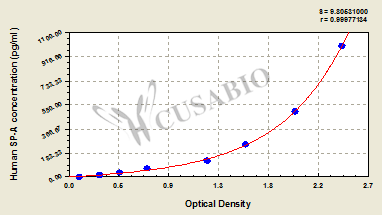Pulmonary surfactant-associated protein A1 (SFTPA1) is a key component of pulmonary surfactant, a complex mixture of lipids and proteins that reduces surface tension in the alveoli and supports normal respiratory function. This hydrophilic protein plays important roles in lung homeostasis, including surfactant metabolism regulation, innate immune defense against respiratory pathogens, and maintenance of alveolar stability. Type II pneumocytes and Clara cells in the lungs primarily produce SFTPA1. Expression levels often change in various pulmonary diseases, making it an important biomarker for respiratory research and clinical studies.
The Human Pulmonary surfactant-associated protein A,SP-A ELISA Kit (CSB-E08683h) provides quantitative measurement of SFTPA1 in human samples using a sandwich assay principle. This kit works with multiple sample types including serum, plasma, cell culture supernatants, and urine, with a detection range of 15.6 pg/mL to 1000 pg/mL and sensitivity of 3.9 pg/mL. The assay requires 50-100 μL sample volume, operates with detection at 450 nm wavelength, and can be completed within 1-5 hours.
Application Examples
Note: The following application examples are drawn from a selection of publications citing this product. For additional applications, please refer to the full list of references in the "Citations" section.
This ELISA kit has been used in clinical research studies to measure pulmonary surfactant-associated protein A levels in human serum samples. The applications span respiratory disease research and biomarker studies where SP-A serves as an indicator of lung function and pulmonary health status.
• Respiratory disease research: Quantification of SP-A levels in patient serum samples to study pulmonary conditions and lung-related pathologies
• Biomarker profiling: Measurement of SP-A alongside other pulmonary biomarkers to determine comprehensive respiratory health panels
• Clinical biomarker studies: Analysis of serum SP-A concentrations in patient populations for disease characterization and research applications
• Pulmonary health monitoring: Evaluation of surfactant protein levels as indicators of lung function and respiratory system status






